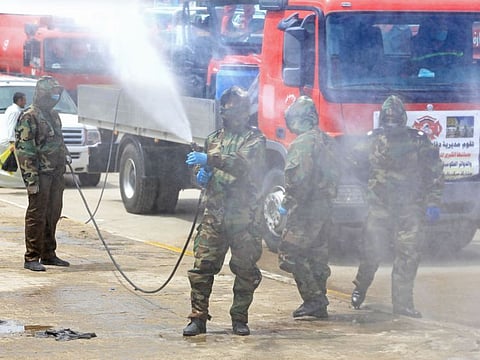Coronavirus: How Middle East can tackle future pandemics
Countries with resilient economies in region were able to better confront the pandemic

Sooner or later the world will overcome the pandemic and life will slowly return to normality. It might take months but the threat of the novel coronavirus will be overcome.
What is crucial though, are the many lessons countries in our region are willing to learn from this unprecedented calamity.
There have been many predictions, some sombre others optimistic, about the shape of post-pestilence world from geopolitical, economic and social angles.
Humanity will adapt, as it has always done, to new norms. But the threat of a new wave of global viral threat must not be ignored.
As each country revisits its own experience in battling the pandemic, there will be a need to adopt a regional strategy to confront future health challenges
The Middle East too has been stricken by the disease. Countries with resilient economies were able to confront the pandemic through capable public health infrastructures.
Transparent societies were much quicker in handling the crisis while closed societies were not.
Politically divided countries
But what is certain is that economically weak and politically divided countries presented a common threat to the rest. For the region to recover and reopen its economies, every country must heal itself and be ready to interact with others. One stricken country will threaten others with infections.
Priorities will have to be rearranged. There will be a dire need to invest more into public health systems. While richer countries will be able to do so almost immediately, others will not.
This is why a new common approach and understanding to regional security will have to be reached.
As each country revisits its own experience in battling the pandemic, there will be a need to adopt a regional strategy to confront future health challenges.
Countries that had successfully acted and contained the spread, like the UAE, Jordan, Saudi Arabia and others, will have to document their efforts so that a new protocol in predicting, reacting and enforcing protection and containment measures is made available for others.
While some pundits talk about a new world order coming out of the pandemic, the reality is that we need to adopt a new humanitarian order, especially for our region.
One of the many lessons that need to be learned is that the disease is more likely to infect the poor, less privileged and socially unprotected people.
A new approach to social security, universal health insurance and societal solidarity is needed. It is as important as investing in schools, factories, ports and roads.
When society is hit the first line of defence are doctors and well equipped hospitals. No country, no matter how rich it is, is able to handle an epidemic without the right health infrastructure.
But a new humanitarian order goes beyond investing in doctors and hospitals. It should enable governments to provide health services to every citizen and while the economy is shutdown, it should provide necessary essential needs to every family under lockdown.
Failure of the League
One thing that was clear during the current crisis is that regional institutions were nowhere to be found. The Arab League failed to act and its relevant institutions were absent.
Each and every government had to deal with the pandemic on its own. The region cannot afford a repeat of this disaster. If and when a new pandemic strikes, as some health experts warn, the region, not to mention the world, must react in a different way.
Aside from what we now know: that there was a worldwide shortage in testing kits and ventilators; we also know that lengthy economic shutdowns have hurt millions of families. Not all governments were able to provide immediate assistance.
The fear of a social backlash as a result of the lockdown is real. It is a clear and present danger and such a backlash in one country will affect the national security of the entire region.
A new humanitarian order for the region is a good investment for all. It should kick in when the entire region is facing a common enemy; a plague, natural disasters and civil wars.
When millions of people in our region are affected there should be a common approach to helping those in need: the poor, the unemployed, refugees among others. Those are the collateral victims of a global or regional calamity such as the coronavirus pandemic. When the danger is lifted it is those who will continue to suffer for months if not more.
No recovery can take place if major sections of society are left unaided. And again regional security and stability is in the interest of each and every country in the region.
A humanitarian order that is based on empathy and solidarity is not a luxury. It should become a pillar of regional stability. The pandemic will end one day, but its effects on millions of people in our region will last for a long time to come.
Osama Al Sharif is a journalist and political commentator based in Amman



